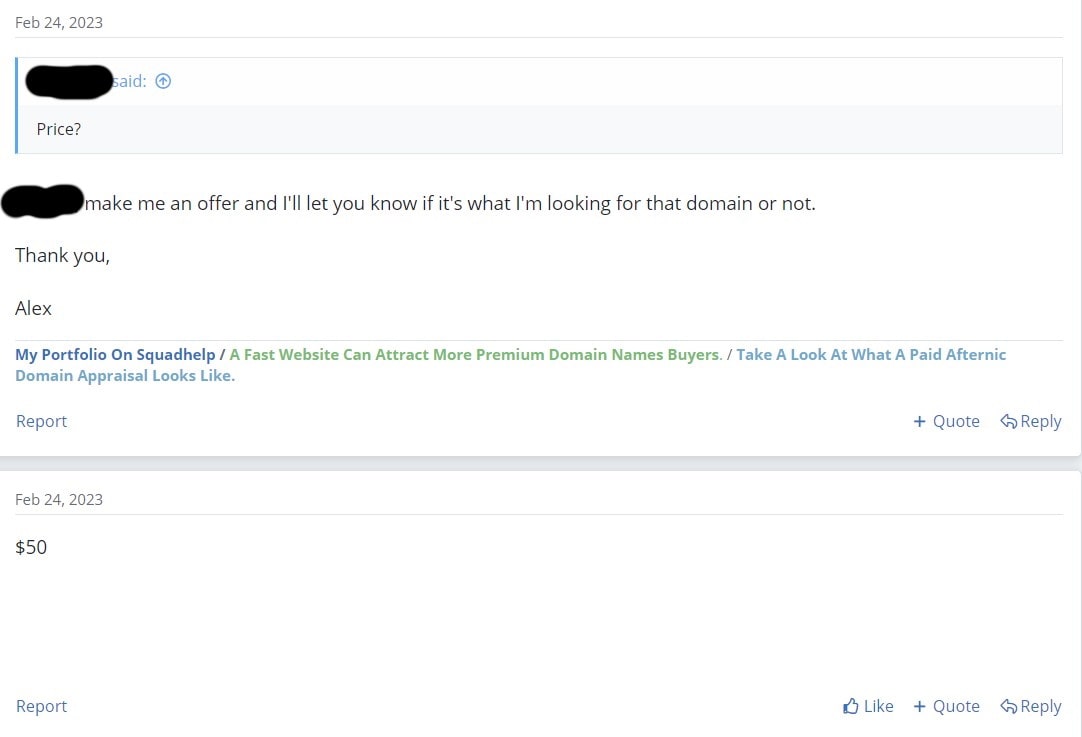Knowing the Value of Domains and Avoiding the Reputation Damage from Insulting Offers that Devalue an Investor’s Worth in the Industry.
As domain investors, we all know that the domain market can be quite volatile. It can be difficult to determine the exact value of a domain, and what may seem like a reasonable offer to one person may be considered a lowball offer by another. But, when you receive offers of $50 for a domain that you’ve paid over ten times more for, it can be frustrating to say the least. What’s even more frustrating is when these lowball offers come from seasoned domainers who should know better.
We understand that everyone is trying to buy low and sell high, and that’s perfectly fine. However, there should be some common sense that tells you not to offer derisory prices for domain names that obviously worth way more than your tiny offer. It’s one thing to try and negotiate a good deal, but it’s another thing entirely to insult someone with a lowball offer.
Most of the time, we don’t even bother responding to these offers. We like to negotiate, but when we’re so far apart in terms of pricing, it’s not even worth the effort. We also prefer to sell at retail prices, not wholesale prices. There are cases when you need liquidities, and then it’s OK to sell for less your domains, but other than when you really need money, don’t sell your domains cheap, because people will talk about it, and all will know that they can buy very cheap from you.
There are a few instances when a lowball offer may seem reasonable. For example, if you have a domain that you’ve been holding onto for years and it hasn’t generated any interest, then a lowball offer may be better than no offer at all. In this case, you may need to reassess the value of the domain and decide if it’s worth holding onto it any longer.
Another instance when a lowball offer may seem reasonable is if you’ve acquired a domain through a bulk purchase or auction and you’re looking to quickly turn it over for a profit. In this case, you may be willing to accept a lower offer just to move the domain quickly and free up some capital.
In most cases, lowball offers are not reasonable and should be avoided. Not only do they waste time and effort, but they can also damage your reputation in the industry. If you’re known for accepting lowball offers, then people will start to take advantage of you and you’ll find it difficult to sell your domains for what they’re truly worth.
So how do you determine the value of a domain? There are many factors to consider, including the length of the domain, the keywords used in the domain, the extension, and the market demand for the domain.
It’s important to do your research and understand the value of your domains before setting a price.
Once you’ve determined the value of your domain, it’s important to stick to your guns and not accept lowball offers. If someone offers you a price that’s significantly lower than what you’re asking, don’t be afraid to counter with a higher price. Negotiation is a key part of the domain industry, but it’s important to know your worth and not settle for less.
While lowball offers may seem reasonable in certain situations, they are generally not acceptable and should be avoided. As domain investors, we need to know our worth and not settle for less than what our domains are truly worth. By doing our research, setting fair prices, and negotiating with confidence, we can ensure that we receive the best value for our domains and maintain a strong reputation in the industry.
Have you ever received a lowball offer for one of your domains? If so, how did you handle the situation?
Did you negotiate or simply ignore the offer? And if you’re a seasoned domainer, how do you determine the value of your domains and avoid receiving lowball offers? Share your experiences and insights in the comments below.


